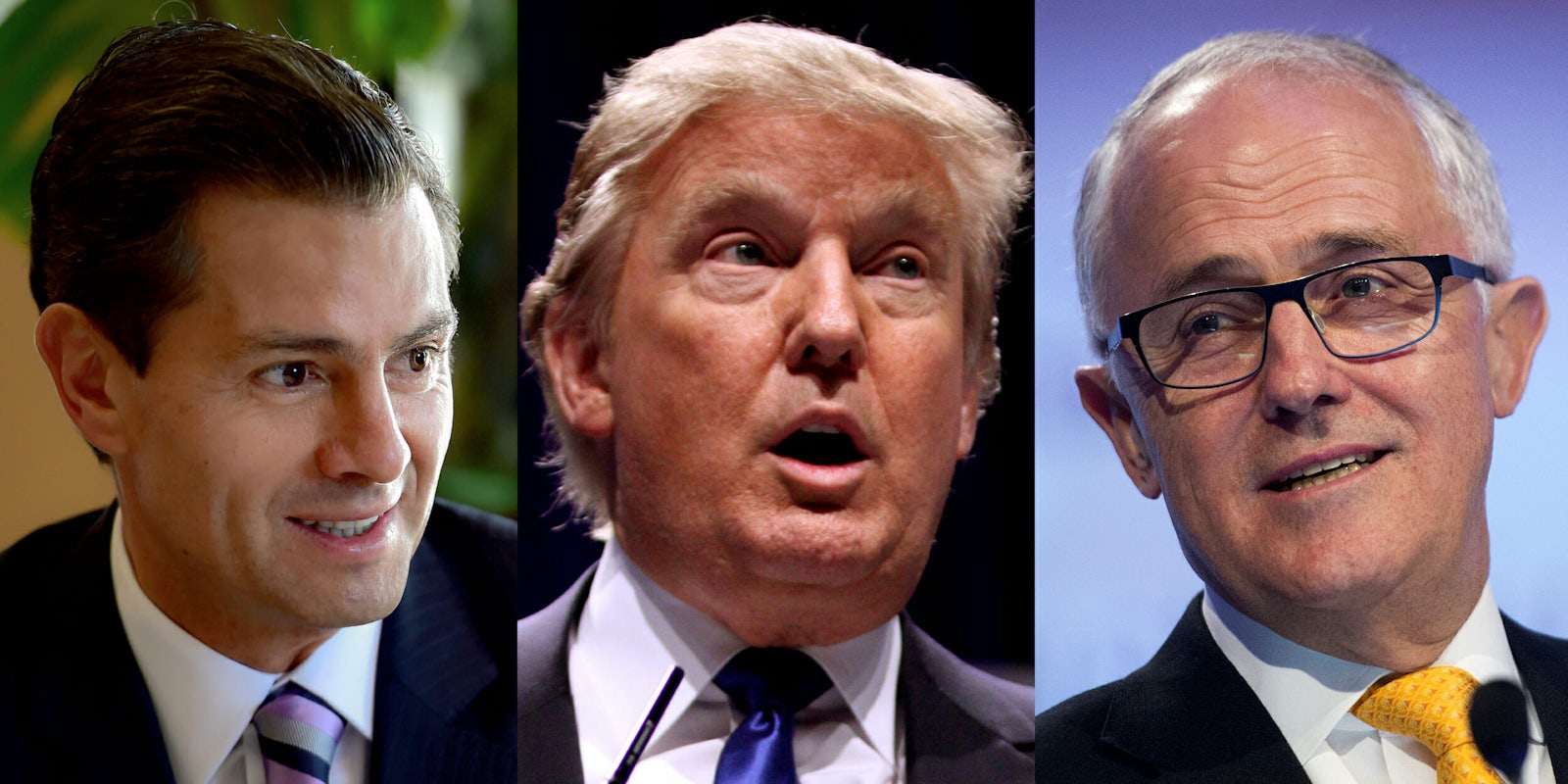The Trump administration’s war on leakers is still far from over.
The Washington Post on Thursday published leaked classified transcripts of President Donald Trump‘s calls with Mexico’s president and Australia’s prime minister during his first days in the Oval Office. The transcripts reveal how Trump deals with foreign leaders, particularly on key campaign issues like trade and immigration.
While the transcripts reveal a few controversial admissions on Trump’s part, they largely paint the picture of a new president focused on sticking to his campaign promises. Here’s a quick run-down of the key moments from the two calls.
Trump, Nieto disagree on U.S.–Mexico border wall
During Trump’s Jan. 27 call with Mexican President Enrique Peña Nieto, Trump reiterated his stance that the U.S. must impose tariffs on goods imported into the United States from Mexico in an effort to stop American companies from moving factories there and to equalize the trade imbalance between the two countries. Trump also offered to help Mexico deal with drug cartels by using the U.S. military to crack down on the drug trade.
“We have the drug lords in Mexico that are knocking the hell out of our country,” Trump said. “They are sending drugs to Chicago, Los Angeles, and to New York. Up in New Hampshire—I won New Hampshire because New Hampshire is a drug-infested den—is coming from the southern border. So we have a lot of problems with Mexico farther than the economic problem.”
Perhaps the most notable moment of the call came when the two leaders discussed Trump’s proposed wall along the U.S.–Mexico border. During the campaign, Trump repeatedly promised that Mexico would fund the wall’s construction—an assertion Nieto publicly refuted.
After Nieto reasserted that his “position has been and will continue to be very firm saying that Mexico cannot pay for that wall,” Trump urged the Mexican president to keep that position private.
“But you cannot say that to the press. The press is going to go with that and I cannot live with that,” Trump responded. “You cannot say that to the press because I cannot negotiate under those circumstances.”
Nieto then suggested that they could “look for a creative way to jump over this obstacle,” in reference to the issue of the wall. Trump agreed to move on from the topic.
“I do not bring up the wall but when the press brings up the wall, I will say, ‘let us see how it is going—let us see how it is working out with Mexico,’” Trump said. “Because from an economic issue, it is the least important thing we were talking about, but psychologically, it means something so let us just say ‘we will work it out.’”
Trump, Turnbull argue over refugees
On Jan. 28, Trump capped off a day of calls with foreign leaders with a tense conversation with Australian Prime Minister Malcolm Turnbull over the subject of refugees. The day before, Trump issued an executive order temporarily banning travelers from seven Muslim-majority countries and suspending America’s refugee program.
At issue was a deal the Obama administration made with Australia’s government to consider admitting up to 2,000 refugees whom Australia had refused to allow into their country. Trump did not want to honor the deal because, he said, doing so “sends such a bad signal.”
Turnbull attempted to explain that Trump need not admit any refugees but instead go through the process of vetting the people in question—Turnbull said they were primarily economic refugees—and then decide whether to admit anyone.
“The obligation is for the United States to look and examine and take up to and only if they so choose—1,250 to 2,000,” Turnbull said. “Every individual is subject to your vetting. You can decide to take them or to not take them after vetting. You can decide to take 1,000 or 100. It is entirely up to you.”
Trump largely ignored Turnbull’s attempts to convince him to honor the deal, asserting repeatedly that Australia refused to allow the refugees into their own country because they were “prisoners” who would likely commit acts of terrorism—an argument Turnbull dismissed as false.
“This is going to kill me. I am the world’s greatest person that does not want to let people into the country,” Trump said. He later added: “I look so foolish doing this. [I] know it is good for you but it is bad for me. It is horrible for me. This is what I am trying to stop. I do not want to have more San Bernardino’s or World Trade Centers. I could name 30 others, but I do not have enough time.”
Ultimately, Trump decided to honor the deal despite his firm opposition to it. “I am going to say that I have no choice but to honor my predecessor’s deal. I think it is a horrible deal, a disgusting deal that I would have never made,” Trump said.
Trump ended the call with a note of frustration, calling it “the most unpleasant call all day.” Prior to speaking with Turnbull, Trump had spoken with Japan Prime Minister Shinzō Abe, French President François Hollande, Russian President Vladimir Putin, and German Chancellor Angela Merkel.
“I have had it. I have been making these calls all day and this is the most unpleasant call all day,” Trump said. “Putin was a pleasant call. This is ridiculous.”
